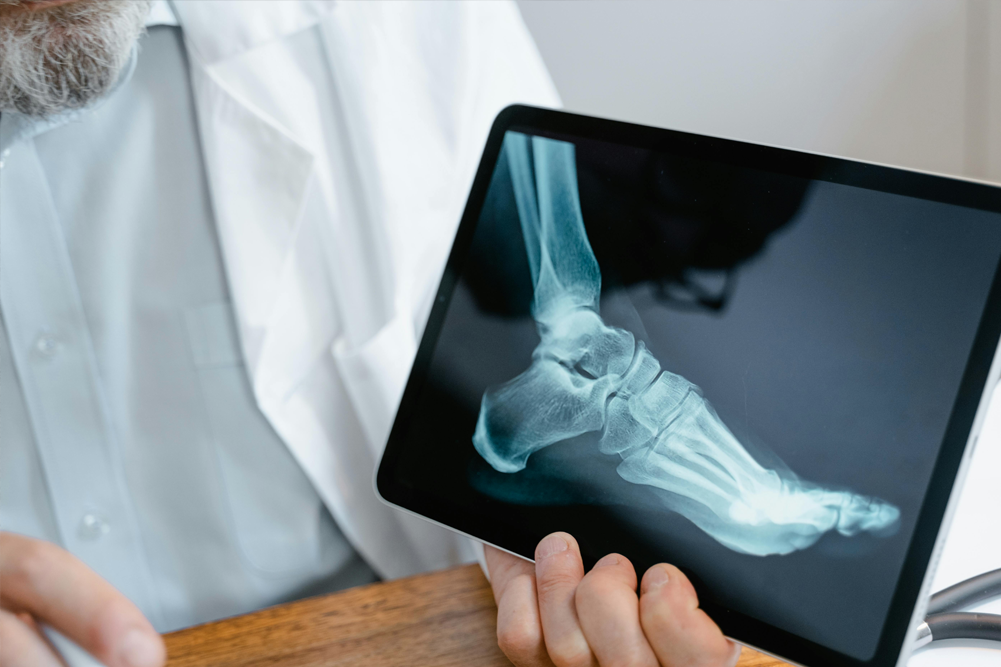Calcium in the blood or urine? What can it tell you about bone loss?
When it comes to bone health, calcium is the first nutrient that comes to mind—and for good reason. It’s the most abundant mineral in the body, with 99% of it stored in our bones and teeth. However, it isn’t just important for keeping your bones strong. It also plays a vital part in nerve function, muscle contraction, blood clotting, and heart rhythms.
Your body controls how much is in your bloodstream because it’s so important a mineral. That’s where blood and urine tests come in—they can reveal important clues not just about your calcium levels, but about your bone health, too.
Why calcium balance matters
Your body constantly works to maintain the right amount of calcium in your blood. This delicate balance depends on several factors:
- How much you eat in food or supplements affects levels
- How well your intestines absorb it
- Your phosphate levels
- Hormones such as parathyroid hormone (PTH), estrogen, and calcitonin
If your blood calcium drops too low, your body “borrows” it from your bones to keep things stable. Over time, this can lead to bone loss. On the flip side, if the levels in your blood are too high, your body needs to get rid of the excess—either by storing it in bones, flushing it out in urine, or even depositing it in soft tissues, which can lead to health issues.
What’s a normal blood calcium level?
A blood calcium test is usually part of a standard metabolic panel. It gives a snapshot of how much calcium is currently circulating in your bloodstream.
Normal blood levels vary according to where you get the tests done. Usually there is a range next to your result under the date you had the test. There is a low and high level of the range. Obviously if you are close to the lower or higher level if your lifestyle and eating patterns continue you will soon be either over or under the range. This is why it is important for your natural health practitioner to also see your blood tests so they can advise you about your eating and lifestyle habits to get healthy and stay healthy. So, if your results are regularly not correct don’t brush it off. It’s worth a closer look.
Why a 24-Hour urine calcium test matters
While a blood test shows how much calcium is in your bloodstream, a 24-hour urine calcium test shows how much your body is excreting. This can tell you if your body is losing calcium at an abnormal rate—possibly even pulling it from your bones.
Here’s how the test works:
- Your doctor gives you a special container.
- You collect all your urine over a 24-hour period.
- The sample is returned to the lab for analysis.
Before the test, you’ll be asked to avoid things like calcium supplements, alcohol, and heavy exercise for 24–48 hours.
What’s a normal range for urine calcium?
The test shows if you are not absorbing calcium well, or your kidneys may be conserving it too much. Or you may be losing too much calcium, possibly due to bone breakdown.
High urine calcium—what it could mean
Excess calcium in your urine is called hypercalciuria. It could indicate several underlying issues:
- Hyperparathyroidism (overactive parathyroid glands)
- Too much in your diet or supplements
- High levels of vitamin D
- Kidney dysfunction
- Certain medications (like diuretics or corticosteroids)
- Certain cancers or other systemic conditions
Low urine calcium—what it could mean
On the flip side, low calcium in the urine may suggest:
- Poor calcium absorption from your diet
- Kidney problems that prevent excretion
- Low parathyroid hormone (hypoparathyroidism)
- Low vitamin D levels
All of these conditions affect how calcium is processed in your body and could impact bone health.
What you can do about this?
Calcium blood and urine tests are powerful tools, but they’re not definitive on their own. Think of them as the beginning of a deeper conversation about your health. If your levels are too high or too low, don’t settle for vague answers like “Let’s just monitor it.”
Ask your doctor what could be causing this? Is this related to my bones or something else? Should we repeat the test or run additional labs? Taking a proactive role in your health means asking questions and seeking clarity.
If you’re told your calcium levels are “a little off,” it may be tempting to ignore it but small changes in calcium can be the early warning signs of bone loss or more serious conditions. The earlier you investigate, the more options you have for prevention and treatment.
Protecting your bones for the long haul
Understanding your calcium lab results help you make smarter choices—whether it’s modifying your diet, adjusting supplements, or exploring treatment for an underlying condition. Strong bones start with good information, and that starts with you.
If you’re unsure where to begin, that’s okay. Talk with your natural therapist or seek a second opinion if necessary, and keep learning about what your body is telling you. The more informed you are, the better you can advocate for your health—and your bones will thank you for it. Also remember that calcium affects your teeth. If you want to know more about how to care for your teeth and dental health go to my article at https://www.wellbeing.com.au/body/health/dental-health-is-an-important-part-of-your-wellbeing.html
This clinic at www.stressfreehealthmanagement.com specialises in getting you healthy and keeping you healthy. We are in the wellness industry so it’s not just about helping you when you get sick. It’s about helping you stay healthy so you don’t get sick. That is what real natural healthcare is about. So, contact your naturopath, nutritionist or therapist today to see how your health can improve.





